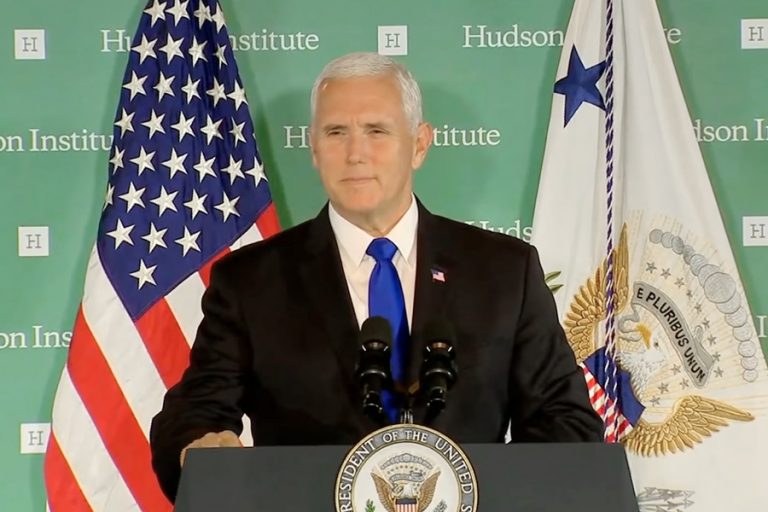On Oct. 4, U.S. Vice President Mike Pence delivered a 40-minute speech at the Hudson Institute in Washington, D.C., laying out the Trump administration’s stance on China. Pence’s remarks signal a new direction in Washington’s relations with the world’s most populous country and its ruling Chinese Communist Party (CCP).
“After the fall of the Soviet Union, we assumed that a free China was inevitable,” Pence said. “Heady with optimism at the turn of the 21st century, America agreed to give Beijing open access to our economy, and we brought China into the World Trade Organization.”
But as the economy soared to become the second-largest in the world, the state of human rights in China deteriorated. Internationally, the Chinese regime has used its growing might to undermine the United States, its allies, and other countries as it pursues its goals to shore up its totalitarian regime.
“Previous administrations,” Pence said, had “hope that freedom in China would expand in all of its forms.” “But that hope has gone unfulfilled.”
A new line
The Trump administration has favored a hard line on Beijing’s disregard for proper business practices, failure to honor its commitments, and dismal human rights record.
Success
You are now signed up for our newsletter
Success
Check your email to complete sign up
Pence detailed the Chinese regime’s hostile actions toward the United States, including stealing industrial secrets and carrying out operations to exploit divisions across American society — most recently in the run-up to the 2018 midterm elections.
On the 2016 presidential campaign trail, Donald Trump listed protectionist Chinese government policies and widespread intellectual property theft as the main culprits behind a large U.S.-China trade deficit.
Since the beginning of this year, the Trump administration began a series of punitive measures, starting with crippling sanctions on China’s flagship electronics company ZTE, which was found to be transferring American-produced electronic components to Iran and North Korea.
ZTE is a key firm in the CCP’s “Made in China 2025” plan, which, in Pence’s words, “ set its sights on controlling 90 percent of the world’s most advanced industries, including robotics, biotechnology, and artificial intelligence.”
Many Chinese industries have benefited from massive intellectual property theft and espionage from the United States and other countries.
Starting in June, Washington has started to levy tariffs on goods imported from China. On September 24, the U.S. government imposed a 10 percent tariff on US$200 billion worth of Chinese goods.
According to many observers, among them Vice President Pence, the Chinese regime sees an opportunity in the upcoming U.S. midterm elections — and beyond — to alter American foreign policy.
“As we speak, Beijing is employing a whole-of-government approach, using political, economic, and military tools, as well as propaganda, to advance its influence and benefit its interests in the United States,” Pence said in his speech.
“To put it bluntly, President Trump’s leadership is working, and China wants a different American President.”
Pence cited a Chinese regime document called “Propaganda and Censorship Notice” as laying out the CCP’s strategy for influencing the United States. China, it said, must “strike accurately and carefully, splitting apart different domestic groups.”
“Under President Trump’s leadership, the United States has taken decisive action to respond to China with American action,” Pence said.
‘A better path for all the Chinese people’
While the vice president made it clear that the United States has shifted its position on China and economic relations with Beijing, he also stressed the historic friendship between the American and Chinese peoples.
“When China suffered through indignities and exploitations during her so-called ‘Century of Humiliation,’ America refused to join in and advocated the ‘Open Door’ policy, so that we could have freer trade with China, and preserve their sovereignty,” Pence said.
In World War II, the United States came to China’s aid in the war against Imperial Japan, and “ensured that China became a charter member of the United Nations, and a great shaper of the post-war world.”
Highlighting the difference between the Chinese nation and the Communist Party, Pence said, “but soon after it took power in 1949, the Chinese Communist Party began to pursue authoritarian expansionism. It is remarkable to think that only five years after our nations had fought together, we fought each other in the mountains and valleys of the Korean Peninsula.”
Pence suggested that Taiwan, which has been run by the World War II-era Chinese government after being driven from the mainland, was a “better path” for the Chinese people.
“While our administration will continue to respect our One China Policy, as reflected in the three joint communiqués and the Taiwan Relations Act, America will always believe that Taiwan’s embrace of democracy shows a better path for all the Chinese people,” Pence said.
Pence’s speech and and President Trump’s foreign policy imply that the United States is taking the ideological background of the CCP more seriously in its engagement with Beijing. In his speech, Pence noted the ongoing and worsening persecution of Chinese Christians, Muslims, and Buddhists.
Meanwhile, the United States’ unyielding stance on trade issues is tempered by Pence’s gestures of goodwill, such as his acknowledgement that the United States and China have “worked closely on issues of common interest, most importantly the denuclearization of the Korean Peninsula.”
“Our vision of the future is built on the best parts of our past, when America and China reached out to one another in a spirit of openness and friendship,” Pence said.
Follow us on Twitter or subscribe to our weekly email














